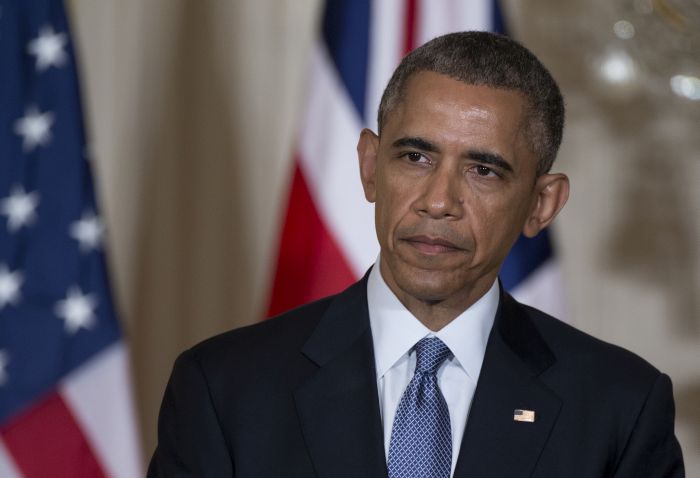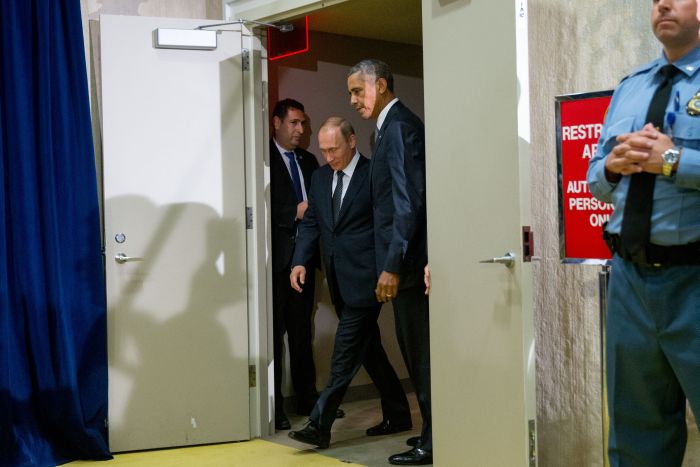Obama's Foreign Policy Doctrine. Containment of China or Pivot to Asia. Part 3
© Associated Press
Viewed from from China’s point of view, “America’s Pacific Century” means a continued commitment to unilateral US hegemony in East Asia.
The Pivot to Asia essentially means containing what is now probably the biggest economy and second biggest military power in the world in its own back yard, and is drawing the USA further and further into territorial disputes involving China. Clinton’s own speeches and writings when Secretary of State made this abundantly clear:“By virtue of our unique geography, the United States is both an Atlantic and a Pacific power. We are proud of our European partnerships and all that they deliver. Our challenge now is to build a web of partnerships and institutions across the Pacific that is as durable and as consistent with American interests and values as the web we have built across the Atlantic. That is the touchstone of our efforts in all these areas.
Our treaty alliances with Japan, South Korea, Australia, the Philippines, and Thailand are the fulcrum for our strategic turn to the Asia-Pacific.”
(Hillary Clinton, “America’s Pacific Century”, Foreign Policy October 11th 2011)
Viewed from from China’s point of view, “America’s Pacific Century” means a continued commitment to unilateral US hegemony in East Asia; “working relationships” means treating China not as a great power but on the same basis as Japan, Vietnam, Philippines; “Bilateral security alliances” are with potential enemies of China; references to the US position in Europe suggests creation of a NATO in East Asia; democracy promotion threatens China with same fate as USSR.
The hostility to China has been made clear by subsequent US actions, especially in economic field: The Trans-Pacific Partnership, and even more the crude and unsuccessful attempt to block China’s creation of Asia Infrastructure Investment Bank.
It is true that some of China’s actions have been highly provocative, especially in South China Sea; but no attempt has been made by US policy under Obama to distinguish between different Chinese claims, or to propose compromises (thus as far as I can see, China has a good claim to the whole of the Senkaku/Diaoyu islands, a good claim to share the Paracels 50:50 with Vietnam, but no legitimate claim at all to the Spratlys or Scarborough Shoal). Instead, US is drifting towards backing anti-Chinese positions in all cases.
I have been appalled by two recent pieces of news in particular: The talk in the Obama administration of getting Cam Ranh Bay from Vietnam as a US naval base – which would risk tying USA inextricably to Vietnamese territorial claims; and the US proposal that India participate in naval patrols in South China Sea. India wisely refuses – because China can hit back very hard in Himalayas, and by support for Pakistan and would do so if challenged by India in the South China Sea. Such moves may be too detailed for the President to take a personal hand – but they illustrate whole tendency of US establishment to maintain US dominance, and not to seek compromise with other powers unless absolutely unavoidable, as in Syria. In the case of China, the US may well be forced to acquiesce in Chinese faits accompli; but may also be drawn into Vietnamese war to defend what Hanoi sees as its territory, with disastrous results for whole of mankind.
Both the cases of Ukraine and the Pivot to Asia go against the enlightened realism that Obama claims to represent. They violate the ethic of consequences by not thinking through the likely results of US actions; they fail the fundamental realist test of accurately judging the power available to both sides and their willingness to use it; and they fail Hans Morgenthau’s test of a true statesman, which is the ability to put himself into the shoes of his opposite numbers from rival countries: not necessarily in order to agree with them, but to judge how important a given issue is to them, and therefore what resources they will commit and how much they will risk over the issue. In Ukraine, Russia has clearly been willing to commit far more than the USA, and the USA has only avoided a much more dangerous conflict because President Putin is in the end a cautious and pragmatic former secret service official, not a reckless militarist. In failing to seek compromise with China, the USA may be running infinitely greater risks.
This failing however is that of the US establishment in general. US ideological nationalism (euphemistically known as “Exceptionalism”) means that in the end, very few US policymakers or analysts can accord any legitimacy to views or interests that seriously conflict with those of the USA, and above all, cannot grant any real legitimacy to political systems that are neither democracies nor subservient to US wishes).
In conclusion however, it is only fair to add two things: On what Obama has called – and what obviously is - by far the biggest threat facing the USA and mankind in the foreseeable future, Obama has been entirely correct, while most of the US political establishment (including all the Republican Party though not, it must be noted Hilary Clinton) has been wrong: this is the need to take serious action to combat climate change. Here, I think one can say that he has gone as far as the US constitution and present political configuration will allow him to go. Tragically, that is not very far – as evidenced by the impossibility of passing legislation through Republican-dominated Congress (or even for that matter when Democrats in a majority) and latest Supreme Court decision blocking the President’s Clean Power plan. But at least he has tried, and tried hard.
For this and other reasons, I would say that in many ways Obama is the best foreign policy president the USA has had since George Bush senior or the Nixon-Kissinger combination (which is admittedly not saying much); but despite some of his statements in the Atlantic Monthly, he has not been able to free himself sufficiently from the Washington foreign policy elites and the shibboleths to which they became addicted during the long years of American global dominance, and achieve a truly realistic US world policy which corresponds to the new world and America’s new relative position in it.
Then again, he has at least tried, which is more than his likely successor Hillary Clinton has tried to do. Whoever wins in November, we are likely to look back on Obama’s foreign policy with considerable nostalgia.

Part 1. Obama's Foreign Policy Doctrine. If So, Has It Worked?

Part 2. Obama's Foreign Policy Doctrine. Ukraine and Russia
Anatol Lieven is a professor at Georgetown University in Qatar and a visiting professor at King’s College London. He is author among other books of America Right or Wrong: An Anatomy of American Nationalism and Ethical Realism: A Vision for America’s Role in the World (with John Hulsman).
Views expressed are of individual Members and Contributors, rather than the Club's, unless explicitly stated otherwise.
Download all 3 parts in 1 PDF file
Views expressed are of individual Members and Contributors, rather than the Club's, unless explicitly stated otherwise.



